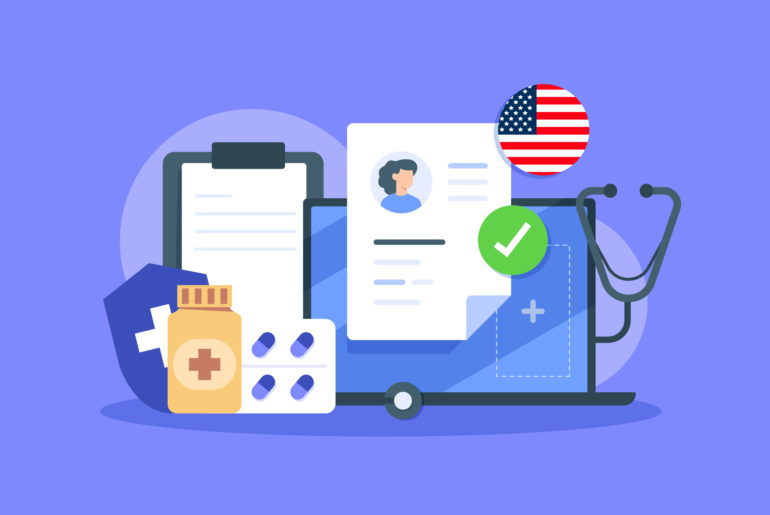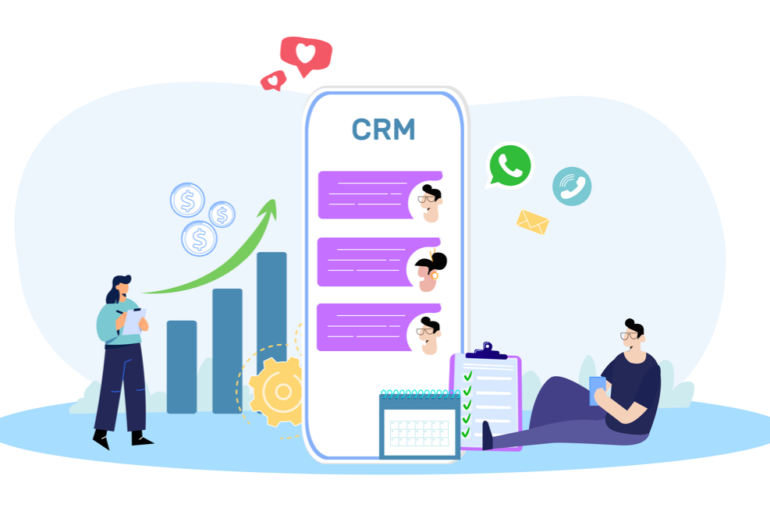Contents
Car dealerships are fast-paced environments where you have to simultaneously manage multiple leads, respond to new inquiries, and maintain good relationships with prospects in your sales pipeline. Keeping everything organised to ensure each lead gets enough attention can be challenging. Fortunately, there’s a tool specifically designed to help with this: a CRM (Customer Relationship Management system).
A good automotive CRM can streamline your sales process, enhance communication, and boost your sales by up to 300% – all without breaking the bank.

In this article, we’ll cover everything you need to know about automotive CRMs, how to choose the best one for your dealership, and how to make the most out of it to meet your ambitious sales goals.
What is an automotive CRM?
An automotive Customer Relationship Management (CRM) is a software designed for car dealerships to manage customer interactions, streamline their sales processes, and keep track of customer data in a meaningful way, ultimately boosting sales. An automotive CRM allows you to do the following tasks more efficiently and effectively:
- Collect leads from various sources, like your website, social media, or ad platforms, and manage them from a central place.
- Coordinate your sales activities for multiple prospects in different stages of buying – all in one place.
- Collaborate with your team members on new leads.
- Personalise messages and interactions to build stronger impressions and customer relationships.
Features to look for in an automotive CRM
An ideal automotive CRM software should address the specific needs and challenges of your dealership. However, with so many options available, finding the right CRM can feel overwhelming. Luckily, it becomes much easier if you know which features matter most. Here are some key features to look for in an automotive CRM:
Central location for client management
An ideal automotive CRM should help you easily collect and manage all your leads and clients from a central location. This includes storing their names, contact information, purchase history, and any notes on previous interactions. No matter where or how you generated a lead, having all this data in one place makes it much easier to keep track of each customer and their journey.
As the baseline, your CRM should also help you automate the process of capturing new leads in one place, while streamlining your process of sending timely follow-ups, and tracking each lead’s status so no potential sale slips through the cracks.
Communications tools
A good automotive CRM should also ease your communications with your lead . Most potential car buyers prefer quick communication and expect you to address their queries right away. Therefore, it’s important that your CRM syncs with messaging apps, emails, and also comes with a call feature, so you can contact your leads with the most convenient communication tools. Appropriate communication tools can be a game changer in improving customer engagement, and therefore, chances of converting them.
Integration
Having integrations with external platforms (such as lead sources) ensures that your data flows automatically into your CRM. For example, being able to integrate your Facebook Lead Ads with your CRM helps you instantly capture new leads on your device so you can contact them immediately, or assign them to the right team member. You can reach out to new prospects quickly without needing to manually access and export them from the original source yourself. You may also want to look out for inventory management integrations if it’s a priority.
Automation
Repetitive tasks, such as downloading leads, scheduling follow-up reminders, or typing out your usual follow-up scripts can take up a lot of time and effort. These tasks can delay your outreach and make your leads go cold. Therefore, an ideal CRM should be able to take care of repetitive tasks and free up your time so you can focus on high-value activities like personalising interactions with customers.
Team collaboration
If you work in a team, a good CRM fosters better communication and collaboration among your team members. It should allow you to distribute leads, assign tasks, share client notes or sales resources, and monitor progress in real-time, keeping everyone on the same page.
Analytics and reporting
Detailed performance metrics and visual dashboards are crucial for understanding what’s working and what isn’t. Your CRM should enable you to track overall and individual sales performance, helping you make data-driven decisions to improve your team’s lead conversions.
How to choose the right Automotive CRM for your dealership
Now that you know the essential features of an automotive CRM, the next step is to understand which CRM suits your specific needs. Some CRMs are designed for larger teams with relatively complex operations while others cater to smaller car dealers. This is where you find the one that specifically supports your team’s sales process. Here are some factors to look into:
- Ease of use: The best CRM is the one your salespeople will use without difficulties. You don’t want your team members to take time out of their busy schedules to learn a new tool, only to have them repeat the process if the tool doesn’t meet their needs. Therefore, look for a CRM that offers intuitive interfaces and straightforward features. Minimal training requirements mean faster adoption and less frustration.
- Mobile capabilities: Your team is often on the move, so having a mobile-friendly CRM is essential. The ability to access leads, contact them, and update records in real-time from anywhere can be a game changer.
- Scalability: Your dealership might be small now, but what about next year or the year after? A scalable CRM can grow with you, saving you the hassle of having to switch systems later.
- Automation: Not all CRMs offer the same level of automation. A good CRM must be able to take care of repetitive tasks such as importing leads, scheduling follow-ups, and tracking the status of each contact. The right automation helps your team to focus more on engaging in meaningful conversations with their leads, which is super important for closing more deals.
- Integrations: Your CRM should integrate with the tools you already use, such as your marketing platforms and lead sources so all your lead data can be synced. Otherwise, there’s no point in having a CRM that is disconnected from where you’re generating leads.
Best practices: How to implement your automotive CRM successfully
The right CRM can significantly improve the speed and effectiveness of your sales process and help you close more deals. However, to maximise its potential, it’s essential to follow best practices. If you’re aiming for ambitious sales growth, these practices can make a big difference. Here are some key strategies to implement for a successful outcome:
Manage and update data regularly
Keep your database clean and accurate by regularly updating contact records. Make sure customer information is updated after every interaction. Some CRMs like Privyr even allow automatic activity logging so your salespeople’s activity timeline with each lead is always updated in real time.Regularly inspect your integrations
Most platforms you connect with your CRM are regularly updated; thus the integrations need to be updated as well. These updates can sometimes disrupt your existing integrations, causing data sync issues. If your leads aren’t automatically downloaded into your system, you risk missing out on valuable opportunities. Therefore, always ensure your integrations are intact.
Prioritise personalisation and targeted outreach
Use the data in your CRM to customise your outreach. For instance, you can segment customers by previous purchase history or service visits, and then send them relevant promotions or reminders. Many CRMs automatically segment customers based on past interactions. You’ll want to prioritise this information for effective communications. People are more likely to engage with you if you send them relevant follow-ups or content.
Pay attention to small details
Take note of important customer details, such as birthdays, anniversaries, or favourite car models, and use this information to personalise your subsequent interactions. Small gestures can go a long way in building loyalty.
How to leverage customer data for growth
Your CRM collects a wealth of customer data, which can be a goldmine for driving sales and business growth. By leveraging this data strategically, you can gain valuable insights into customer behavior, optimize your processes, and uncover new opportunities. Here are some actionable steps you can take:
- Analyse trends and patterns:
Track which vehicle models are popular, the average time it takes to close a sale, and where your leads are coming from. Use these insights to fine-tune your marketing and sales strategies, ensuring your efforts align with customer preferences. - Segment your audience:
Group customers based on shared characteristics, such as demographics, purchase history, or service needs. This segmentation allows you to run highly targeted marketing campaigns. - Identify upsell and cross-sell opportunities:
Use CRM data to identify opportunities for upselling or cross-selling. For example, if a customer bought a sedan, they might be interested in a premium version or an SUV for a growing family. You can reach out to them by offering relevant upgrades. - Monitor post-sale engagement:
Keep track of customers post sale. Use your CRM to send reminders for service appointments, warranty renewals, or trade-in opportunities. This not only improves customer satisfaction but also increases the likelihood of repeat business. - Forecast demand and sales:
Analyse historical data to predict future sales trends. For example, identify peak periods for specific car models or promotions, stock inventory accordingly, and prepare your team for busy seasons. - Benchmark against competitors:
Compare your CRM data to automotive industry benchmarks where possible. Understanding how your dealership performs relative to competitors can help you identify strengths and areas for improvement.
How Privyr can help you boost your automotive sales by up to 300%
Privyr is a mobile-first CRM specifically designed for small to medium salespeople that are always on the move and interact with their customers via WhatsApp, text, call, and more. If you’re looking for an affordable and scalable solution you can operate from any device you want without any restrictions, Privyr can be the best automotive CRM for your operations.
Check out how this car dealership improved their lead conversion by 30% using Privyr
If you want to manage and track your salespeople’s performance, Privyr also comes with a Teams feature that gives you real-time insight into their lead response times and pipelines.
Privyr offers:
- Powerful mobile app with Meta Conversions API integration (useful if you run Facebook Lead Ads).
- A central location to access and engage all your leads and clients.
- Seamless integration with all major lead sources
- AI feature that automatically detects and imports leads from your email inbox.
- Instant new lead alerts for all your lead sources.
- Instant access to your lead’s details as they will be automatically imported to your phone. No need to copy-paste, type, or save your new lead’s contact details to your phonebook manually.
- Tap to to message new leads directly on any communication channels with auto-personalised follow-up templates for WhatsApp, Telegram, SMS, and iMessage, and more.
- Automatic lead distribution and assignment among your salespeople.
- Automatic follow-up reminders for each lead.
Try Privyr for free by clicking this link.
Conclusion
Having a CRM software can be great for your automotive sales performance. However, this doesn’t mean you need to limit your search to a tool labeled specifically as an “Automotive CRM.” Choosing the right CRM depends on your unique sales process, the support your team requires, and how your customers prefer to communicate.
Most CRMs offer free trials, so take advantage of these opportunities to test their features and compatibility with your needs. This ensures you’re investing in the right product before committing your money.






